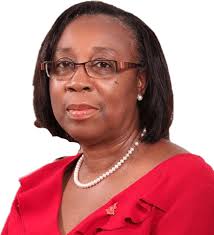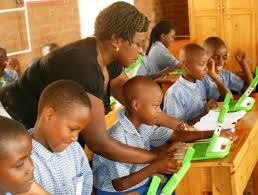Olabisi Deji-Folutile
If schools have to wait for this virus to go before they can resume business, I don’t know how many of them will survive
 President Muhammadu Buhari was presented with two difficult choices early this week as the COVID-19 pandemic rages on – a choice to continue the lockdown of Lagos, Ogun and the Federal Capital Territory to further curtail the spread of the pandemic; or a decision to relax lockdown in these states and the FCT for businesses to reopen. Each of the two choices had its own consequences. Although, the Minister of Health, Osagie Ehanire, didn’t quite express it, one could feel his pains while responding to journalists’ enquiry on when the economy was likely to be unlocked during one of the briefings of the Presidential Task Force on COVID-19. He said he had presented the facts of the situation to the President and that only the President could take a decision on the matter. Truly, opening the economy at this time appears to be a risk, looking at things from a scientific point of view. Not with the rising figures of infected cases amid low testing capacity.
President Muhammadu Buhari was presented with two difficult choices early this week as the COVID-19 pandemic rages on – a choice to continue the lockdown of Lagos, Ogun and the Federal Capital Territory to further curtail the spread of the pandemic; or a decision to relax lockdown in these states and the FCT for businesses to reopen. Each of the two choices had its own consequences. Although, the Minister of Health, Osagie Ehanire, didn’t quite express it, one could feel his pains while responding to journalists’ enquiry on when the economy was likely to be unlocked during one of the briefings of the Presidential Task Force on COVID-19. He said he had presented the facts of the situation to the President and that only the President could take a decision on the matter. Truly, opening the economy at this time appears to be a risk, looking at things from a scientific point of view. Not with the rising figures of infected cases amid low testing capacity.
On the other hand, the pressure on the President to open up the economy was enormous. Businesses are desperate to survive and people are no longer patient. In Lagos, people are already disobeying lockdown order so as to keep body and soul together. No one can blame them. It’s tough to keep the economy grounded in the face of hunger and job losses, without palliatives that go round from government. Unfortunately, the slow pace of testing is not helping matters. For more than one month of total lockdown, barely 10,000 people have been tested for COVID-19 infection in Nigeria’s population of nearly 200 million.
To worsen the situation, the Nigeria Centre for Disease Control, said it was targeting two million people for testing in the next three months. Simply put, it would take three months to test about 10 per cent of Nigeria’s population. Even at that, the agency’s Director General, Chikwe Ihekweazu, said that was a very ambitious target. So, where do people start from? For how long would they have to wait? It’s obvious Nigeria does not have the capacity to deal with the problem. So, heads or tails, none of the decisions would be palatable to the citizens.
Anyway, the President has taken a decision. All things being equal, partial economic activities should resume in Lagos, Ogun states and the FCT on May 4, going by the President’s nationwide broadcast on April 27. The President had given economic reasons for relaxing the total lockdown. Since many workplaces are opening as from Monday, school owners also wanted to know when schools would be reopening. The Minister of State for Education, Emeka Nwajiuba, said there was no date yet as Nigeria would not want to put its children at risk. According to the minister, none of these schools could function on their own without the society.
The minister is absolutely right on the need to protect the lives of Nigerian children. The poser to the education minister, however, is: how is government planning to take care of the business interest of these school owners since they are also businesspeople in their own rights? If the Federal Government is opening up the economy for business reason, what provision is the country making for businesses that could not possibly open because of the good of all?
Recall that Lagos State has warned private schools against commencing the third term academic session. The FCT also gave a similar warning. Meanwhile, many states have commenced radio classes for pupils in public schools to keep them busy. Private school owners have also tried to offer online classes to their pupils as well. But, in many cases, parents are being asked to pay for this service. This has resulted in a dilemma. Parents want to know what they are paying for. If schools are not starting the third term, what would children be learning online? And if parents pay for online teaching, would that take care of third term school fees?

Already, nothing much is happening at the tertiary level in terms of online teaching. Many private higher institutions are not doing anything. The few ones running online are complaining of huge data cost. Lagos State is also trying to enforce online teaching in its university and polytechnic, but students are citing high cost of data and other factors as reasons why it won’t work.
Education is a business that is highly regulated in Nigeria. A lot of things are controlled by government. That is why the sector is likely to be worst hit by this pandemic. Considering that school environments naturally encourage large gathering, which is often discouraged to curb the spread of coronavirus, schools may have to remain shut long after lockdown is relaxed.
The logical thing, therefore, in this circumstance, is for government to engage in meaningful discussion with private education providers on how to ease the burden that could be imposed on them by prolonged school closure. This is important because school owners are also business entrepreneurs that may go bankrupt without reliefs from government. If schools have to wait for this virus to go before they can resume business, I don’t know how many of them will survive This is why I think government should consider a bailout for some of them.
We can’t afford to dismiss these private school operators. They have been formidable partners with government over the years in meeting the educational needs of Nigerians. Let’s take universities as an example. Nigeria currently has 43 federal universities, 52 state universities and 79 private universities. At the secondary school level, data from the National Bureau of Statistics show that there were 967,847 public secondary schools in Nigeria in 2017 and 279, 204 private schools in the same year. We know that the number of private schools is likely to be higher than this because many of them are not registered. We may argue that the owners are in business but they are also helping government to widen access to education.
As business entities, these private schools are also employers of labour. Their interventions go a long way in reducing unemployment in the country. So, they are stakeholders that cannot be ignored. Government should also remember that these schools have bills to pay. How do you pay teachers for doing nothing? And if these schools decide not to pay, it is likely to become a problem for the larger society. Besides, most of their workers are Nigerians, so government should be interested in their plight. Government cannot justify locking down a sector of the economy while unlocking others without showing consideration for the sector locked down.

That is why the Federal Government should find a way of making things work for everyone including education providers in the private sector. There is no guarantee that schools will reopen soon going by how far Nigeria has been able to manage this pandemic. Thus far, Nigeria has neither done enough tests nor showed any capacity to do so in the nearest future. Data from worldmeters.info describes Nigeria as a country having one of the worst testing coverage in the world.
To help school owners, government could consider working out some palliatives for registered schools to ease the burden of keeping schools running without students during this period. This may not be an easy option for a government that is also paying its teachers for doing nothing as it were, but doing this is in the overall interest of the nation. With this, private school providers won’t have any reason to think that they are being singled out to suffer the consequences of COVID-19 in Nigeria.
Olabisi Deji-Folutile is Editor-in-Chief, franktalknow.com and member, Nigerian Guild of Editors. Email: bisideji@yahoo.co.uk
FEEDBACK
Minister Adamu: Online migration goes beyond ministerial directive
Dear Bisi,
I work with one of the Government Regulatory Agencies and have participated at the national level on the development of e-learning policy and implementation; as well as National Policy on ICT in Education both by the Ministry of Education and for this reason; I would not want my name published.
Your write up on the above subject is interesting and we hope all parties will see beyond ministerial directive. To further enlighten the public on the issue of online learning and teaching, the universities should be more responsible and own more of the blame.
All the universities you mentioned in your write up created platform to enhance and provide access to quality education for the convenience of their lecturers and students apart from the fact that their respective governments provided enabling environment.
Coming back to Nigeria, we should endeavour to not always put the bulk of the blames on government but instead ask if those that should be responsible at their own levels are doing the needful.
The National Universities Commission (NUC) established the National Virtual Library and also directed universities to create an Institutional Repository to complement this effort.
The NUC also established the Nigeria Research and Education Network (NgREN) to cater for the impasse that is now a national issue. But stakeholders’ participation to ensure this is a success just like what they have in South Africa is nothing to speak about. This project would have increased access to online teaching, learning and research as well as collaboration and resources sharing. The platform would have helped reduce the cost of bandwidth capacity to the education sector, provide dark fibre for local network access and infrastructure as well as create quality local education content. All these efforts have not materialised because of politics, lack of participation and funding.
Furthermore, there have been several ICT related interventions in the public universities by NCC, USPF, NITDA, CBN and TETFund. All these interventions have not been well utilised by the beneficiaries (Universities and other Tertiary institutions).
On the issue of bandwidth, we need to ask the universities what they do with the ICT fee collected from students’ year in year out. How many of the universities can boast of good campus network or even maintain the ones provided for them through interventions by the government agency? How many of the universities can boast of a Learning Management Systems? How many of the lecturers understand how to create electronic content? Over 80 per cent of lecturers have personal Laptops, what are these devices used for?
The fact is majority of our lecturers are not innovative in teaching. Although some make use of technology in teaching but the number is about 10 per cent.
To conclude, the government has its own fault in terms of ensuring funds are well spent and channelled to the right cause, ensuring effective monitoring and evaluation system by the respective agency; and ensuring that a well articulated and implementable policy on e-learning are in place. Although this is in place but are not implemented.
Finally, government should make it mandatory that every lecturer must provide an electronic copy of their subject with the inclusion of weekly/monthly assessment to be included in the university LMS. This should be part of their own (lecturers’) assessment and promotions.
If all these are implemented, ASUU will stop blaming people for their own irresponsibility and government on the other hand, will be further exposed for lack of funding and innovation in education. This will also expose NITDA, NCC and TETFund for not prioritising funds to ensure our education system is competitive.
Thanks once again for your write up. I hope my mail will help in further research and analysis on the subject matter.
Editor Bisi,
Thank you for this brilliant piece. You have said it all. The government is not serious about moving tertiary education sector forward. The major problem is inadequate funding and the insensitivity of government to cries of ASUU for a redress of the problem.
It is perhaps only in Nigeria that employees pay for the tools with which they work for the employer. For example, l bought the laptop I am using for official duties. In fact, l took loan from the Cooperative to buy it because l could not save to buy it.
When the Minister said we should migrate to online teaching, assuming there was no strike, who bears the cost of data? Now that there is strike, and our salaries for three months have not been paid, from where will l get money to buy data?
The issue of ICT-backed infrastructure you mentioned is there. This is largely absent due to poor funding.
Olubunmi Ajibade, PhD
Dept of Mass Comm.
University of Lagos.






















